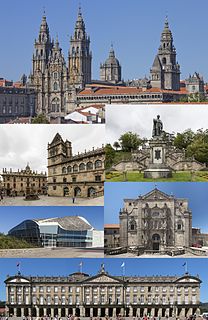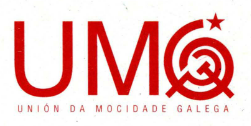Galician League Liga Gallega | |
|---|---|
| Leader | Alfredo Brañas |
| Founded | 1898 |
| Dissolved | 1900 |
| Ideology | Galicianism Conservatism Political Catholicism Traditionalism |
| Religion | Catholicism |
The Galician League of Santiago de Compostela (Liga Gallega in both Spanish and Galician language [1] ) was a conservative and Galician regionalist political group founded in 1898 in Santiago de Compostela. The main figures of the League were Alfredo Brañas and Salvador Cabeza de León. [2]

Santiago de Compostela is the capital of the autonomous community of Galicia, in northwestern Spain.

Spanish or Castilian is a Romance language that originated in the Castile region of Spain and today has hundreds of millions of native speakers in the Americas and Spain. It is a global language and the world's second-most spoken native language, after Mandarin Chinese.

Galician is an Indo-European language of the Western Ibero-Romance branch. It is spoken by some 2.4 million people, mainly in Galicia, an autonomous community located in northwestern Spain, where it is official along with Spanish. The language is also spoken in some border zones of the neighbouring Spanish regions of Asturias and Castile and León, as well as by Galician migrant communities in the rest of Spain, in Latin America, the United States, Switzerland and elsewhere in Europe.
It was one of the currents in which the Galician Regionalist Association bifurcated. The Galician League of Santiago de Compostela was conservative, while the Galician League of A Coruña was ideologically liberal.
The Galician Regionalist Association was an active regionalist political organization in Galicia between 1890 and 1892.
Conservatism is a political and social philosophy promoting traditional social institutions in the context of culture and civilization. The central tenets of conservatism include tradition, human imperfection, hierarchy, authority, and property rights. Conservatives seek to preserve a range of institutions such as monarchy, religion, parliamentary government, and property rights, with the aim of emphasizing social stability and continuity. The more extreme elements—reactionaries—oppose modernism and seek a return to "the way things were".
The Galician League of A Coruña was a liberal and Galician regionalist political group founded in 1897 in A Coruña by the participants in the regionalist club A Cova Céltiga, with its headquarters in the Carré Aldao library; chaired by Manuel Murguía and directed by a committee consisting of Manuel Lugrís Freire, Uxío Carré Aldao and Salvador Golpe.




